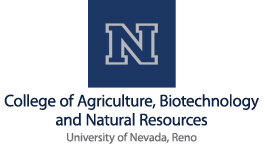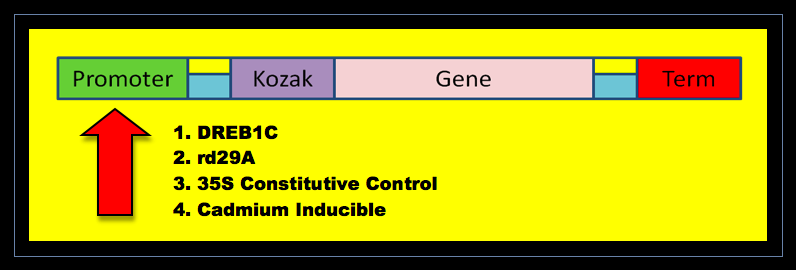Team:Nevada/promoters
From 2010.igem.org
(Difference between revisions)
(→Promoters) |
(→Promoters) |
||
| Line 28: | Line 28: | ||
<body link=#00ffff> | <body link=#00ffff> | ||
<a href="https://static.igem.org/mediawiki/2010/7/79/GFP_tobacco_plant.jpg"><img src="https://static.igem.org/mediawiki/2010/7/79/GFP_tobacco_plant.jpg" class="shadow" style="float:left;width:170px;margin:10px"></a> | <a href="https://static.igem.org/mediawiki/2010/7/79/GFP_tobacco_plant.jpg"><img src="https://static.igem.org/mediawiki/2010/7/79/GFP_tobacco_plant.jpg" class="shadow" style="float:left;width:170px;margin:10px"></a> | ||
| - | </html><p>The Nevada team has created environmental stress sensors by using <html><a href="https://2010.igem.org/Team:Nevada/RD29APromoter"><span style="color:#1569C7;font-weight:bold;">rd29A</span></a></html> and <html><a href="https://2010.igem.org/Team:Nevada/DREB1CPromoter"><span style="color:#1569C7;font-weight:bold;">DREB1C</span></a></html> promoters to express red fluorescent protein and other bio-fluorescent markers. When induced by environmental stress, plants carrying these genes can easily be detected by the farmer walking through his field or by a plane flying over acres of farmland. Promoter elements are short and easy to work with. They also allow for modification and specialization. <html><a href="https://2010.igem.org/Team:Nevada/DREB1CPromoter"><span style="color:#1569C7;font-weight:bold;">DREB1C</span></a></html> and <html><a href="https://2010.igem.org/Team:Nevada/RD29APromoter"><span style="color:#1569C7;font-weight:bold;">rd29A</span></a></html> both have multiple binding motifs in their promoter regions allowing for variation in expression levels and the particular stresses that induce them. | + | </html><p>The Nevada team has created environmental stress sensors by using <html><a href="https://2010.igem.org/Team:Nevada/RD29APromoter"><span style="color:#1569C7;font-weight:bold;">rd29A</span></a></html> and <html><a href="https://2010.igem.org/Team:Nevada/DREB1CPromoter"><span style="color:#1569C7;font-weight:bold;">DREB1C</span></a></html> promoters to express red fluorescent protein and other bio-fluorescent markers. When induced by environmental stress, plants carrying these genes can easily be detected by the farmer walking through his field or by a plane flying over acres of farmland. Promoter elements are short and easy to work with. They also allow for modification and specialization. <html><a href="https://2010.igem.org/Team:Nevada/DREB1CPromoter"><span style="color:#1569C7;font-weight:bold;">DREB1C</span></a></html> and <html><a href="https://2010.igem.org/Team:Nevada/RD29APromoter"><span style="color:#1569C7;font-weight:bold;">rd29A</span></a></html> both have multiple binding motifs in their promoter regions allowing for variation in expression levels and the particular stresses that induce them. 35S is a constitutive promoter that can be valuable for control groups in stress and other plant response research.</p> |
Revision as of 05:04, 26 October 2010
Promoters

The Nevada team has created environmental stress sensors by using rd29A and DREB1C promoters to express red fluorescent protein and other bio-fluorescent markers. When induced by environmental stress, plants carrying these genes can easily be detected by the farmer walking through his field or by a plane flying over acres of farmland. Promoter elements are short and easy to work with. They also allow for modification and specialization. DREB1C and rd29A both have multiple binding motifs in their promoter regions allowing for variation in expression levels and the particular stresses that induce them. 35S is a constitutive promoter that can be valuable for control groups in stress and other plant response research.

| 
| 
| 
| 
|
|---|
 "
"
